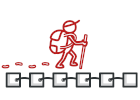
Iterator in Go
Iterator is a behavioral design pattern that allows sequential traversal through a complex data structure without exposing its internal details.
Thanks to the Iterator, clients can go over elements of different collections in a similar fashion using a single iterator interface.
Conceptual Example
The main idea behind the Iterator pattern is to extract the iteration logic of a collection into a different object called iterator. This iterator provides a generic method of iterating over a collection independent of its type.
collection.go: Collection
package main
type Collection interface {
createIterator() Iterator
}
userCollection.go: Concrete collection
package main
type UserCollection struct {
users []*User
}
func (u *UserCollection) createIterator() Iterator {
return &UserIterator{
users: u.users,
}
}
iterator.go: Iterator
package main
type Iterator interface {
hasNext() bool
getNext() *User
}
userIterator.go: Concrete iterator
package main
type UserIterator struct {
index int
users []*User
}
func (u *UserIterator) hasNext() bool {
if u.index < len(u.users) {
return true
}
return false
}
func (u *UserIterator) getNext() *User {
if u.hasNext() {
user := u.users[u.index]
u.index++
return user
}
return nil
}
user.go: Client code
package main
type User struct {
name string
age int
}
main.go: Client code
package main
import "fmt"
func main() {
user1 := &User{
name: "a",
age: 30,
}
user2 := &User{
name: "b",
age: 20,
}
userCollection := &UserCollection{
users: []*User{user1, user2},
}
iterator := userCollection.createIterator()
for iterator.hasNext() {
user := iterator.getNext()
fmt.Printf("User is %+v\n", user)
}
}
output.txt: Execution result
User is &{name:a age:30}
User is &{name:b age:20}